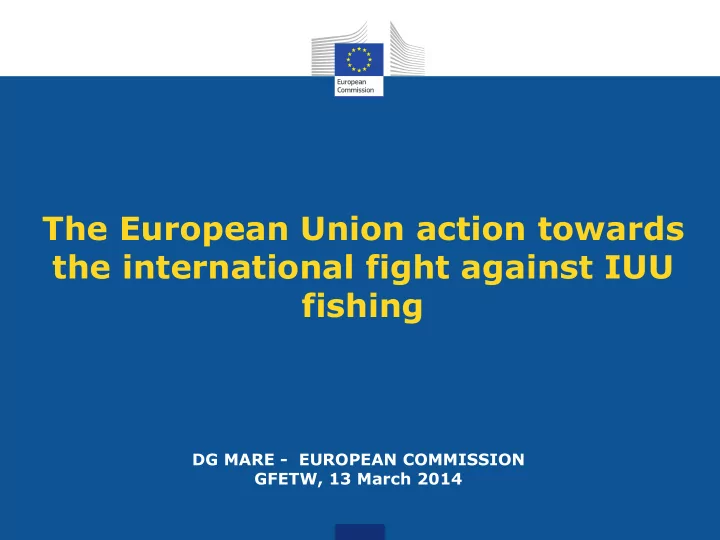

The European Union action towards the international fight against IUU fishing DG MARE - EUROPEAN COMMISSION GFETW, 13 March 2014
Overview • IUU: Global challenge • International tools • EU international role • Reasons for an EU action • EU IUU Policy • Ex ante communication and continuous cooperation • Legal framework • Basic Principles • Scope • Our practical experience: Main objectives and operational tool • EU Catch Certification Scheme • EU Mutual Assistance System • Non-Cooperating Countries lists • IUU Challenges in the near future • Expected benefits of an international concerted action
IUU: Global challenge International tools • International Law • RFMO Measures EU international role • International cooperation
IUU: Global challenge REASONS FOR AN EU ACTION • International consolidated tools are not enough • Environmental and socio-economic impacts on fish stocks, developing countries and legitimate trade • The EU is the largest importer of fishery products: It is essential to ensure traceability in the whole chain – from net to plate – of all fishery products traded with the EU
EU IUU Policy (I) Ex ante communication and continuous cooperation: third countries and stakeholders LEGAL FRAMEWORK • IUU Regulation (No 1005/2008) - enforced on 1 Jan 2010 • Implementing regulation (No 1010/2009): • Amended in January 2010 (No 86/2010), May 2010 (No 395/2010), March 2011 (No 202/2011) and November 2011 (No 1222/2011) • EU IUU vessels list: Commission Regulations No 468/2010, No 724/2011, No 1234/2012, No 372/2013 and No 137/2014 • All information, including regulations, handbook and guidance notes, can be found on: http://ec.europa.eu/fisheries/iuu
EU IUU Policy (II) BASIC PRINCIPLES • Non-discriminatory instrument • Seeks to prevent, deter and eliminate fishery products derived from IUU activities to be traded to/from the EU • Applies to EU Member States and third countries wanting to trade fish with the EU SCOPE • All fishing vessels under any flag in all maritime waters • All processed and unprocessed marine fishery products • Trade to and from the EU
EU IUU Policy (III) OUR PRACTICAL EXPERIENCE: MAIN OBJECTIVES AND OPERATIONAL TOOL • Application of international law rules, laws and regulations of states , including international conservation and management measures • Operational tool: Catch Certification Scheme
EU IUU Policy (IV) OUR PRACTICAL EXPERIENCE: MUTUAL ASSISTANCE SYSTEM • Cooperative tool: systematic exchange of information • Cooperation between the Commission, coastal States and NGOs : More than 100 alert messages • Since 2010, the Commission investigated more than 200 cases with vessels from 27 countries • Results : • More than 10 third countries imposed sanctions against almost 50 vessels • 9 million euros of fines and fees recovered by coastal or flag States in 2011 and 2012, and resulted in several decisions of refusal of importation into the EU
EU IUU Policy (V) OUR PRACTICAL EXPERIENCE: NON-COOPERATING COUNTRIES LISTS – STATE OF PLAY • Published on 15.11.2012 and 26.11.2013 lists notifying respectively 8 and 3 countries of the possibility of being identified as non-cooperating (yellow cards): • 2012: Belize, Cambodia, Fiji, Guinea, Panama, Sri Lanka, Togo and Vanuatu; • 2013: Curacao, Ghana and Korea. • Of the 2012 countries, 6 months were given to improve the situation and for some this was extended until end February 2014. • For 3, a red card was given by identification by the Commission as non-cooperating on 26.11.2013: Belize, Cambodia and Guinea. • Positive dialogue results with other countries • Cooperation between the Commission, coastal States and NGOs
IUU Challenges in the near future • Full implementation 2001 FAO IPOA • FAO PSM Agreement • Global Catch Certificate • IMO number • Increased exchange of information • Chartering • Increased use of new technologies • Improved traceability
Thank you! 11
Recommend
More recommend